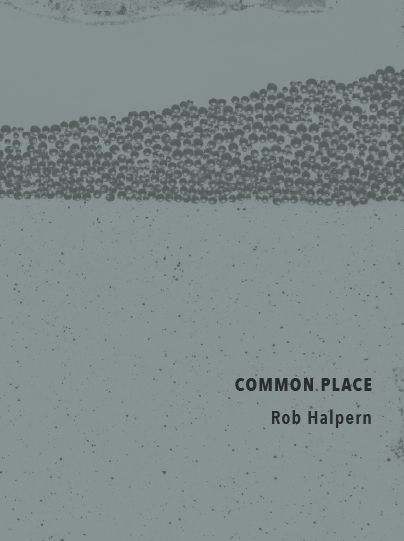a blank resource whose waste excels, a darker place where bodies bend, ribs break in vaster banks, my blunting force, just say whose organ, say whose bone, drafting futures, time negated & not perceived as use, being raw, the stone, the teeth, what strange glamour hangs, a deciduous mulch, the skin, the sky, the latch, the bone

Common Place
Rob Halpern
June 2015
Above the battlefield, some eat their hearts out, spinning.
Julie Patton
Common Place continues Halpern’s sustained inquiry into the relations of body and voice to relentless militarization and economic depredation. Written in enjambed verses and impacted prose, Halpern’s language is at once raw and sculpted, passionate and analytic.
About the Author
Rob Halpern is the author of several books of poetry, including Music for Porn (Nightboat 2013), Disaster Suites (Palm Press 2009), and Rumored Place (Krupskaya 2006). Together with Taylor Brady, he also co-authored the book-length poem Snow Sensitive Skin, which has been reissued by Displaced Press. Recent essays and translations appear in Chicago Review, Journal of Narrative Theory, and The Claudius App. Rob currently splits his time between San Francisco and Ypsilanti, Michigan.
Praise
Drawn from the autopsy report of a Yemeni detainee at Guantanamo who allegedly committed suicide, the lyrical poems and political meditations in Common Place offer a material trace of what remains and what threatens to disappear — not into oblivion but into the commonplace, the cliché of mass burial (otherwise known as “history”). Less a sentence (“hoc est corpus”) than its corrupt remainder (“hocus-pocus”), Halpern’s post-Whitman writing is an incantation of desire (“I sing this body on a table”). But this is a desire like Sade’s or Genet’s: It incinerates, even as it illuminates, the dream of a rumored place that, however occluded by the serial disasters of empire, haunts and sustains Halpern (the body and the author). What remains is the impossible unnaming of a love that never named itself, a withdrawal from propriety and property enacted — paradoxically — through a claiming of bodies as one’s “own” (“my soldier,” “my detainee”), as if this ménage à trois might be the ground of an unremarkable commons.
Tyrone Williams
Every extreme invites its opposite: hard and soft, ciel and celler, hole and whole. With words on target like a vector—a vortex, tree root, luminesce or muscle—Halpern points, reaching back to the organism that made speech organ, all the while exposing, yet suturing, word-wounds with painful beauty. Beauty hurts when language churns against words intended to silence. Blue again. Nipple sky. Approach, retreat, surrender, charge. To do battle with the idea of battle. And ax lots of questions, on all sides. Some writing is about touch, putting one's finger in the wound. Above the battlefield some eat their hearts out, spinning.
Julie Patton
Halpern filters autopsy language through various lyrical and analytic modes, melding it with Whitman, Genet, Foucault, 19th century autopsy manual, Wikileaks document, de Sade, de Beauvoir, Alice Notley, Marx, Hegel, Baudelaire, etc. He dements canons with a determination that ranges from awkward to glorious. Halpern constructs a mountain of contextualizing, higher than the pyramid of human bodies in Abu Ghraib that Lynndie England found so hilarious.
Dodie Bellamy
This is how a detainee makes himself felt inside a sentence that will never contain him,” the speaker, or Halpern, in plain but rigorous language encapsulates the myriad actions comprising Common Place, whose meditations on the autopsy report of a Yemeni detainee at Guantamo who allegedly committed suicide, weave through genres while unhinging precepts of compliance in our world of militarized capital. Halpern’s gaze invites and confronts the morality and ethics of his project—just as the State insists on our visibility while producing horror, corpses, and corn futures—and the feelings it produces; arousal, guilt, and a longing for these things to have a meaning. A meaning that is love.Common Place invites a kind of transubstantiation through Halpern’s transcription; this is our body—“utopia of total insecurity…risk of total relation.
Joel Craig
In the News
Publication Details
ISBN: 978-1-937027-38-4
Trade Paperback
Perfect-bound. 168 pp, 6 x 8 in
Publication Date: June 01 2015
Distribution: Asterism Books (US), Coach House Books via Publishers Group Canada (Canada)
Series: Dossier